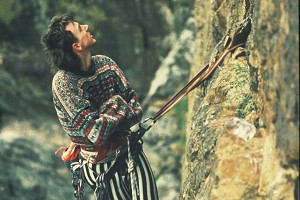
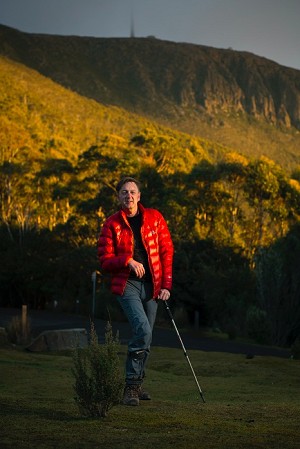
"This book is a personal reflection on my relationship with The Mountain and the qualities this partnership has fostered within me, to meet a new life with new challenges each moment. Those lessons learned in the mountains got me through a harrowing injury and painfully slow recovery, yet I use them still, repeatedly, each day of my second, radically different life. And it is these lessons that enabled a return to The Totem Pole eighteen years later to finally confront the tower in the surging sea that had done me so much harm - and yet paradoxically has made my life so much better."
Here Paul shares the first of three chapters based around mindfulness in climbing, with the focus being on the approach. For more info on the book's publication date keep an eye out on paulpritchard.com.au over the coming months.
We climb down from the vehicle half way up the pass. We step onto the metalled roadway. There are cars parked in the lay-by opposite the boulders. I watch you cross the road and grasp the lichenous timber X of the stile. Stepping onto the first tread you are feeling anxious although you cannot put your finger on it. Your other booted foot lingers for a moment on the road, photographically frozen, tiptoed on the tarmac… Then breaks free. You leave the everyday chitter-chatter on the metallic surface of the road - with the litter, the white lines and 'No Stopping' signs. You briefly balance atop the wall and glance up at the clouds, cumulus all rushing in the same easterly direction.
On the other side you tread softly onto a great expanse of moss. The carpet of moss seems to envelop you as you sink momentarily. This is it. The threshold crossed, you eye a suitable path. Across this glaciated valley, there are two ways. The low path looks muddy from too many feet. Up higher you eye a path which traverses a hillside and meets a scree slope in about a mile and a half. From the top of the scree you can see a patch of hard spring snow, and then the actual rock-face of the mountain. It is a simple choice and you make it without conscious thought. You decide to keep your boots out of the slutch for as long as possible.
You pace for the Thoreauvian West. And like Thoreau, in the town where you live your "obligations to society" are still running around your head. But unlike Thoreau you find value in society, in the urban existence, and realise we must strike a balance if our species is going to last but a few more generations. We must live in a house, unless one wishes to be like Diogenes and live in a barrel. We must use resources. Anyway, less of these ruminations.
You begin your approach, attempting to remain weightless, so as not to disturb the green dewy carpet. A lark levitates from its nest, with a melodic shrill rising in and out of the wind. That bird brings a smile to your face. You turn silently about. I am right behind you.
You walk on. As you fit into your stride you become ever so slowly aware of an alertness. Like a déjà vu. You are waking up. You're increasingly awake to the sound coming from the landscape. A trickle of water. The strangled cry of some distant livestock. Your own footfall seems deafening. Then you hear it. A deep hum. You strain to discern whether the sound is coming from far away or nearby. It's not a car or plane - you are sure of that. Is it coming from the land? Your body? Your head? You cannot discern from where. Not yet.
You walk on, feeling the weight of your clothes, the pack on your back. The stretch of your hamstrings. An aching stillness in your hands. Arching your back you feel the cool moistness of sweat when the damp rucksack is parted from your back. You are breathing heavily now as the path steepens. You feel your heart beating. That mild headache you had when you left the road has all but dissipated.
These first mindful stages of the walk in bring to mind the first stanza of a poem by RS Thomas. It's about going up a track, that will take a car, but is best walked:
On slow foot, noting the lichen
That writes history on the page
Of the grey rock. Trees are about you
At first, but yield to the green bracken,
The nightjars house: you can hear it spin
On warm evenings; it is still now
In the noonday heat, only the lesser
Voices sound, blue-fly and gnat
And the stream's whisper.
You notice that you are alive. Very alive. Alert to the landscape around you, the world around you. You notice a tingling in your legs and arms. The Brownian motion of the billions of atomic nuclei that make up your body - all beings' bodies.
You go deeper.
As the narrow path gains altitude you let your senses open wide like the delicate flower of the morning glory. The moss is disappearing and gives way to an alpine garden. The tiny cuneiform heads of saxifrage and the ever so delicate bobbing white flowers of rock cress. The badger-faced sheep have nibbled the grass down to the quick and rocks break the surface like schools of whales. You pick your way up the hill listening carefully.
"That's it!"
You've got it. You put the side of your head against an anvil sized rock. That's it. You can hear the woodlice underneath the stones on which you tread. This time you smile on the inside, with wonder.
Even though I am three paces behind you we walk in silence and solitude. You experience every footfall, in the present moment. Every air movement, every minute difference in air temperature, in the present moment. Every odour - you smell the grass, the goats on the wind, the lichen on the rocks. The earth… The Earth. The anxiety you were experiencing when you set off from the road-head has gone. It isn't even a memory. It is just not there. The harsh words you used to your lover. You think it ended with telling them to "Fuck right off." You don't regret saying that and you aren't drowning in sorrow. What's said is said. What's done is done. You know you can't alter the past but you can endeavour to make it right from here on in. You make a pact with yourself to pause before opening your mouth in future. You will talk it over with your lover when you get home.
In a similar way, as you climbed over that stile, you had a sense of dread rising from deep inside. You had an inkling it was about what the future holds in store. But you can't put your finger on it. You know you're going to get that redundancy note soon. Maybe that's it. And that this is putting stress on your relationship. So maybe that's it.
"What will become of us?"
Or is it bigger than that? You recently read that according to Oxfam the world's eighty-five richest people own as much as the poorest fifty percent of humanity. And that there is a gyre of rubbish in the Pacific Ocean of 1.6 million square kilometres. Or is your deep-seated worry bigger still? Melting icecaps, deforestation, mass extinctions.
"What about the planet?" you were silently screaming… "What… about… the… planet?"
But for now it's just you and the next footfall. You and the next breath. Inhale… Exhale… You like the feeling of breathing. Inhale… Exhale… It makes you feel alive. Those are all problems. Inhale… Exhale… You realise that, and you will do as much as one person can do to make it right. Inhale… Exhale… Vote for equity, the planet. Use less stuff. Inhale… Exhale… But for now you become an animal once again. Senses open and alert to the Earth. Inhale… Exhale…
There are two elements to the approach to a mountain; there is the external world of the forest, glacier and alpine moor, and the internal world of bone mechanics, pulsing organs, straining ligaments - the workings of the body. The external world requires of you to be alert, stealthy like an animal. Alive to every detail, however minute. The distant clink of another climber's hardware, the kestrel that faces the breeze as it hovers, the single droplet of windblown water onto the back of your hand (it stings a pleasant sting).
The internal workings of your body harmonise with the external senses in a balanced dance of the mind. Not only do you give your full attention to the earth, the smell of the earth, the sound of the earth, the touch of the earth, but with each breath you suck the outside world enters your body. You then use some of it, add some gases of your own, and release it back into the outside world. External becomes internal… Internal external.
You pay close attention to the beating of your heart as you steadily climb up the rising path. It is strong, regular and fast. Your tongue sticks to your palette through lack of saliva. You will take some water at the snow patch. You notice a twinge deep inside your hip joint; it's bordering on painful but you know it will pass. You know any phenomena comes and goes, presents itself and then fades away. Is born and then dies.
The simple act of walking to The Mountain has become a meditation. When you walk you pay attention to your feet, noticing how they strike the bare earth. The words of Thich Nhat Hanh come to mind, "When the past and the future can't pull you away anymore, every step is solid." You note whether your heel strikes first or the ball of your big toe - it is the ball as we climb up the hillside. It will be a heel strike on the way back down. You compare the two feet. You are walking on the outside of your left foot. However, you are maintaining equal weight on each foot. You observe the relationship between your feet, pelvis, knees, ankles, spine and head as you walk. Shoulders, arms. You swing your right arm with your left leg (whereas I swing my right arm with my right leg). You are just paying attention to it. This is enough.
You approach the scree field with the monk's words in your mind. You eye the line we will take across the great sward of talus. You can make out a 'path', well-worn stones over which many feet have trod. Together we will follow this path. On the far side, about five-hundred metres, is the shrinking remnant of a spring snow field. We will aim for that.
But first you pause to urinate, taking particular notice of the hot flush in your genital area. Steam emits from the stream of piss as you feel the relief of your bladder deflating. As you do yourself up a mildly astringent waft catches your nose.
"Am I peeing mindfully?" you ask yourself.
You prepare to tiptoe across the scree slope, intricately poised blocks of about thirty-five degrees - the median angle of repose for this particular dolerite scree - brought down from the mountain face over thousands of years. You are keenly aware of just how ancient the present landscape is. But you are also aware of how dynamic it is. Forever changing. moment to moment.
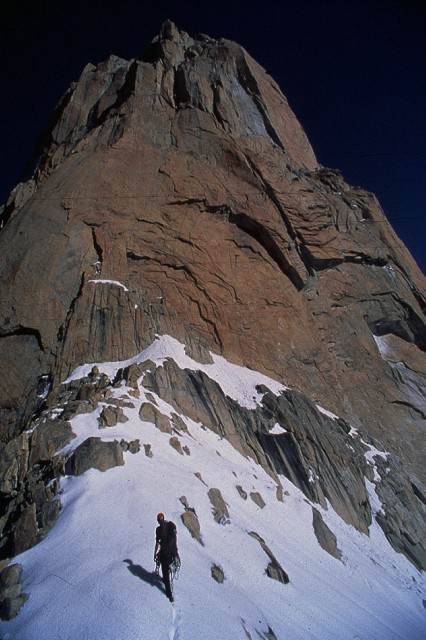
You enter the sea of scree by placing your left boot on a plate of dolerite with the dimensions of a paella pan. You place your foot on the left side of the paella estimating that this seems like the most stable place to step without moving the stone. The white blotched plate holds fast as you make the half-second decision to tread on that portable TV with your right boot.
You will see just how far you can walk without a stone shifting under your feet, under your weight. The difficulty is dependent on the size, shape, texture and dampness of individual rocks. Each individual stone has a tactile signature that you discover through your boot-sole. The texture felt haptically on the underside of your feet; like feedback from a steering wheel in a driving video game you imagine. You gently reprimand yourself for lifting that video game over the stile. You tell yourself it should have stayed in the artificial world.
However, you begin to ponder dependent origination. You do not see the danger of attempting to unpack a Buddhist concept right here in the middle of this great loose tsunami of scree. In the midst of the moving mass - imperceptibly so but still moving - you muse how the existence of that driving game is only possible through conditionality. Everything must come from something. The video game is produced by electricity, which is generated by coal perhaps, which originated in the ancient swamps and peat bogs of the Proterzoic Era, the remnants of which are the mountain you are walking on today. The car is projected on to a silicate glass screen, an amorphous solid, though not quite as impermanent as the rock slide on which you are endeavouring to balance yourself right now.
If not dressed in wet lichen, and thus slimey, the large angular boulders are easy to trust. But, they may rock. Smaller, rounded rocks, are almost impossible to tell, unless you happen to see that the stone has been shifted recently. You notice one domestic iron is not in the same position as it has occupied for years. You can tell this because of the tell-tale pale line between the moss and the iron, which rests on something much larger. You step on it with extra care. It does shift two millimetres. Moss resides in the grykes and ankle twisting holes, and curious hairy lichen grows on some of the blocks.
You sneak on. You pick your footing stone with a burglar's gait, swag bag on your back. Your attempts at treading with care are not altogether futile and you treat walking across the scree as a further lesson in mindfulness. You imagine trying to walk over a dune of golf balls without one shifting. Impossible?
The sun has been hiding behind the late autumn ridge but now it is edging onto your face. You pause, mid-touch-and-go-step - between the anvil and the Roget's Thesaurus - and close your eyes. You let the sun, our sun, warm your mind, warm your heart. You are approaching the far edge of this drifting continent of scree and are content and surprised as to how few rocks shifted under the combined weight of you and your backpack.
You step down from the scree, onto the snow patch. You take the pack off your back and, after retrieving a bottle and some chocolate, you sit on your bag. You put the bottle to your lips and feel, really feel, the icy water as it pours down your throat. You notice the coldness of the fluid as it makes its way down your oesophagus, in little liquid boluses. As it enters your stomach your shoulders make involuntarily quivers.
You place a square of dark chocolate on your tongue, close your lips and sense it melt. You roll the chocolate around your tongue and let the flavonoids and polyphenols enter your bloodstream through your soft palette. You revel in its warm sweetness, like a warm bath on a cold night, and I join you in the cold snow. I throw my own pack down.
Suddenly, your focus shifts from the taste buds to a pin-point silhouette against the sky. A tiny figure on another mountain, high up on a ridge. All else - peaks, angular rock formations, this pencil line of the road down below, slide out of focus - become fuzzy. It is as if you are looking through a telescope… The telescope of the mind… The telescope of perception.
Your journey thus far has been a journey of intense concentration, and intense delight. You delighted in the delicacy of the mosses and, ending here, in the snow, in this very moment, you have found you have let go of your discomforts. You have loosened your grip on your anger. You are beginning to loosen your grip on the sadness - you didn't even know you were sad. So proficient were you at sweeping your grief up into a pile in a dusty recess of the mind, it remained hidden even to you. Just a gnawing doubt about you didn't know what. Now it is time to let go of your anger… Let go of your grief… Let go of your sadness.
In his sixth Principle of Walking Coleridge informs us that "Walking alternates between hypnotic inwardness and intensely felt reality." This is how you just experienced The Mountain, right here on its very flanks - as an intricate pattern of internal and external sense perceptions. In that respect, for Coleridge, simply going for a walk in wild nature, takes us out of our current reality and deposits us in a kind of nirvanic Garden of Eden.
You are now aware of the meditative aspects of going for a walk in the mountains. Of how treading mindfully in raw nature and seeing and feeling every detail of the landscape and your own body can be a doorway. And, what is more, how walking has a proclivity, if you do it often enough, for pushing us toward the edge of awakening.
- REVIEW: The Red Curtain by Dave Barnes - It's Climbing Jim, But Not As We Know It 25 Aug, 2021
- CRAG NOTES: The Ghosts of Bolton Wall 29 Jul, 2020
- Playing the System 4 Oct, 2010

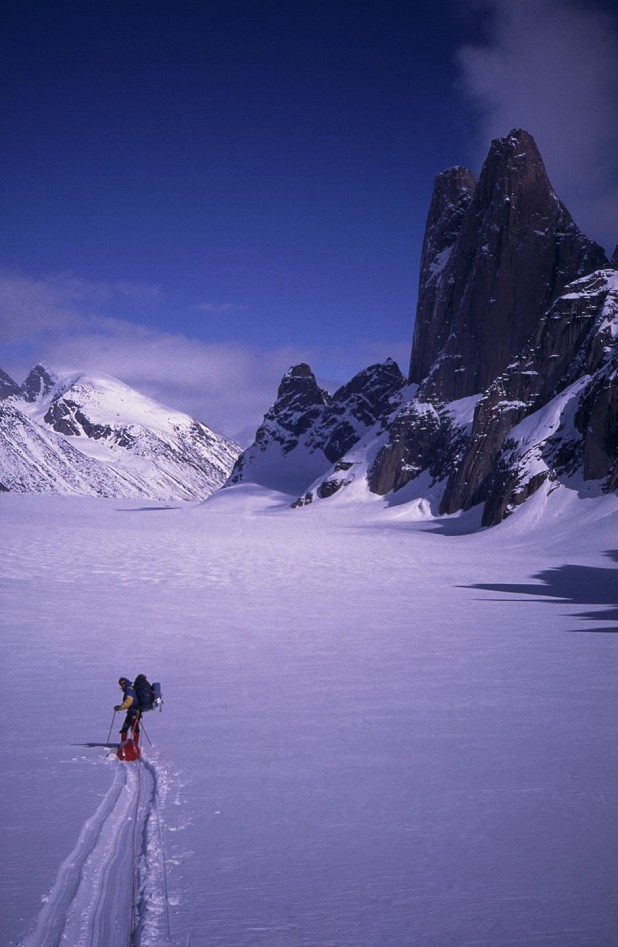
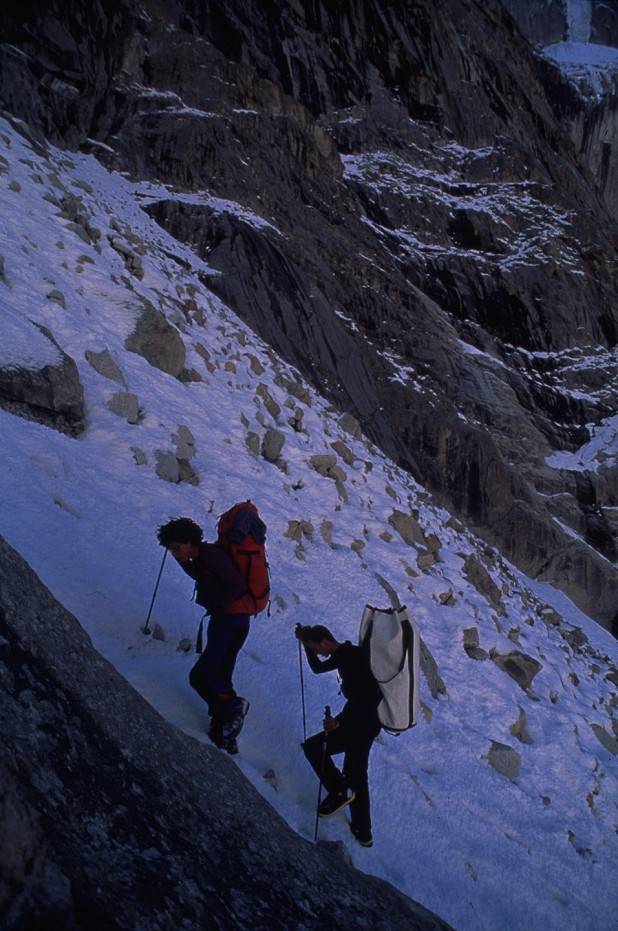
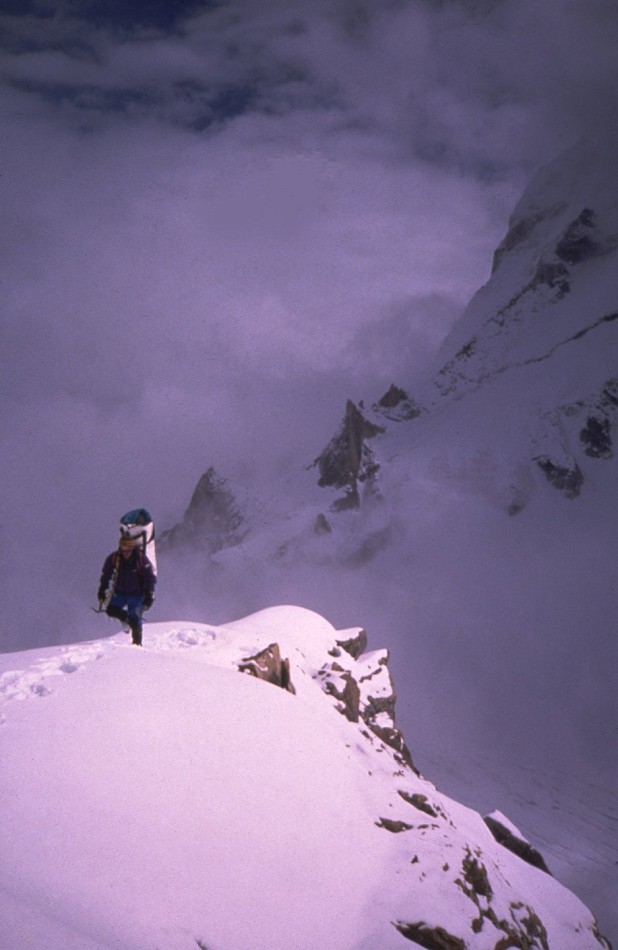
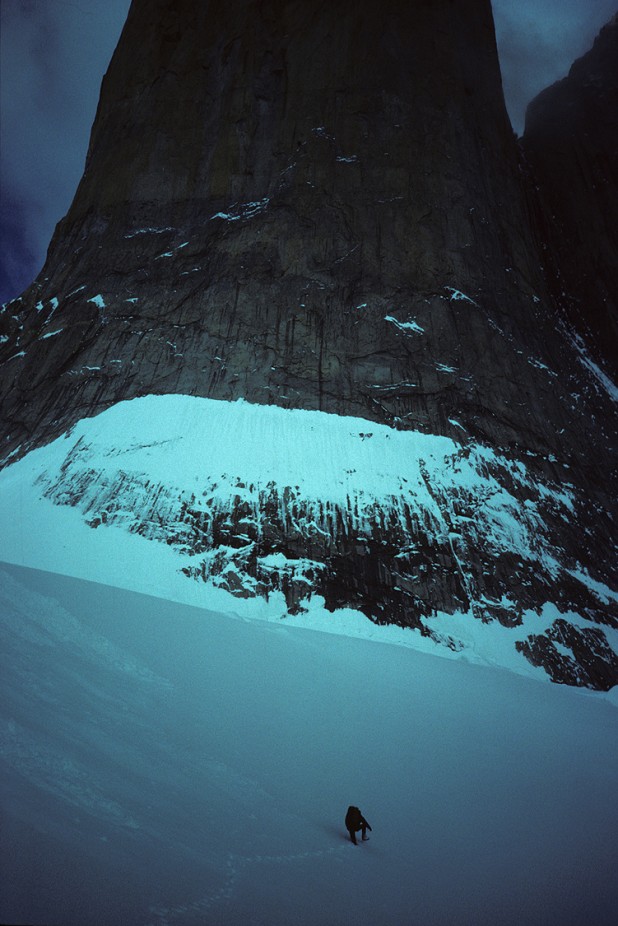
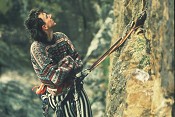
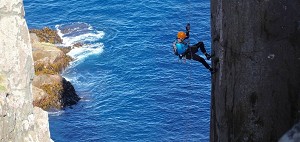

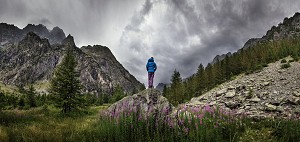







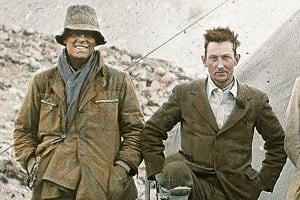
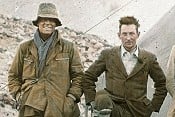
Comments